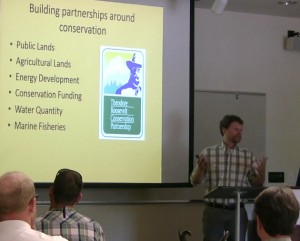By Luke Macaulay, ESPM Graduate Student
My doctoral research focuses on finding practical ways to conserve the rich natural habitats and diverse wildlife that are found on private land. In particular, I research the economic and environmental aspects of recreational hunting, and evaluating whether the income from hunting provides an incentive for habitat conservation.

Joel Webster of the Theodore Roosevelt Conservation Partnership speaks on \"Connecting Hunters and Anglers with their Conservation Roots\" at a July 2014 workshop.
Although early conservation efforts were closely tied to hunting and management of game species, conservation priorities have since shifted toward biodiversity and ecosystem conservation. As such, many conservation biologists today have little personal experience with hunting, despite the fact that tax and fee revenues from hunting provide the predominant source of funding for state wildlife agencies. Many hunters are vocal and influential stakeholders on various conservation efforts such as wetland and habitat restoration, funding of wildlife research programs, gray wolf re-introductions, and lead-free bullet initiatives. Through their membership in organizations like Ducks Unlimited or the Mule Deer Foundation, hunters have helped restore millions of acres of wetland and other habitats, and they often provide funds to help study issues affecting game species. Over the past several years, however, I’ve seen events unfold on high-profile issues like the lead-free bullet initiative in California and the wolf re-introductions in Yellowstone, which have pitted hunters against environmentalists. I see this as an unfortunate turn of events, since many hunters and environmentalists share the over-arching goal of wanting to better conserve wildlife and their habitats.
As a Graduate Student Cooperative Extension Researcher, I am working to bridge this divide. Specifically, I’m gathering information from private landowners and managers to determine how recreational hunting for big game and upland game may influence decisions regarding land-use and conservation practices. This information will help to inform how Cooperative Extension and government programs may be used to encourage practices that not only help to conserve natural resources, but also provide increased recreational benefits on private land.
As part of this work, I organized a workshop in July of 2014 entitled "The Role of Hunting in Modern Conservation Biology." Held at the University of Montana, Missoula, the event was meant to foster a better understanding of conservation issues in hunting and to encourage cooperative conservation efforts between hunters and environmentalists. Bringing together experts and stakeholders on many issues relating to hunting and conservation, the workshop covered a range of topics, from demographic changes in the hunting community to endangered species conservation. This day of presentations and information sharing allowed participants to learn from one another other and to share their experiences with conservation biologists. As presenter Ben Long noted, “there’s too much at stake for us to not be working together.”
Drawing on my experience in public relations, I made a call to the local newspaper to alert them of the workshop, which resulted in a reporter attending and writing up a story for the Missoulian! The article helped to spread our message to a much wider audience than we could reach through the workshop alone. We also taped the event so that those unable to attend could hear the presentations; the series of videos above includes many of the talks from the workshop (which are listed in the schedule below).
The Role of Hunting in Modern Conservation Biology
Workshop Presentations
Introduction: Historical role of hunting and Overview of Workshop – Luke Macaulay, Ph.D. candidate at University of California, Berkeley.
Role of Hunting in Modern Conservation Biology – Ben Long, Senior Program Director of Resource Media
Harvest Ecology: carrying capacity, maximum sustainable yield models and their problems – Dr. Justin Brashares, Associate Professor of Wildlife Ecology and Conservation, University of California, Berkeley.
Connecting hunters and anglers with their conservation roots – Joel Webster, Center for Western Lands Director for the Theodore Roosevelt Conservation Partnership.
Demographic changes in the hunting community – Land Tawney, Executive Director of Backcountry Hunters and Anglers
Hunting in the Developing World: A Powerful (and Problematic) Tool for Conservation – Pete Coppolillo, Ph.D., Working Dogs for Conservation
Using sport hunting to manage non-native game species on Catalina Island – Mark Heath, Shelterbelt Builders (for Charlie de la Rosa, UCLA Ph.D. candidate).
Carnivore re-introductions and hunters: Managing stakeholders to create win-win situations
-
Mike Thompson, Wildlife Manager for Montana Fish, Wildlife & Parks
-
Dave Stalling, Writer and Wildlife Advocate living in Missoula, Montana
Finding Common Ground: Promoting Hunting, Endangered Species Conservation, and Non-Lead Ammunition – Scott Scherbinski, Wildlife Health Outreach Coordinator at California’s Pinnacles National Park
